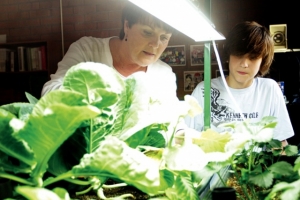Students use garden to explore science
By Phyllis Moore
Published in News on May 8, 2012 1:46 PM

News-Argus/MICHAEL BETTS
Cathie Hooks, left, a teacher at Wayne Country Day School, discusses the progress of a cabbage plant growing in the seventh-grade garden with student Dylan Jones.
Nestled in the back of Cathie Hooks' classroom at Wayne Country Day School are several "earth boxes" containing thriving produce from the students' garden.
Currently, the seventh-grade science class is growing cabbage and strawberries. But earlier in the school year, they have also grown squash and cucumbers, while outside the classroom door, a patch of pansies is in full bloom.
"All of my science projects that we do are big science projects that are funded through grants," Mrs. Hooks said.
Grants received from Tri-County Bright Ideas and Wayne County Chamber of Commerce have helped build up the "hydroponics system" and greenhouse for the garden project that was started last year. The funding provided soil, plants, grow lights, greenhouses and discovery kits, she said.
Based on a self-watering concept, the earth boxes feature a tube and a reservoir in the bottom where water recycles.
They also have two hydroponic greenhouses, she said.
"(Plants) water themselves in a non-soil environment," Mrs. Hooks explained. "It just explores the fact that you don't always need soil to grow things."
Like potatoes, for example.
To demonstrate, she challenged her seventh-graders at the start of the school year to root a potato without putting it in the ground.
"This was a regular potato and we put it in water," she explained. "We talked about the fact that the Earth is 75 percent water. There's only 3 percent fresh water. The potato is 75 percent water. If we put a 75 in a 3 percent water, can we generate new life?
"We didn't know where we were going. We just hoped. We cautiously hoped that something would come."
It's been a slow process, she said, but last week, that all changed.
Last Monday when students arrived to class, the potato in the tiny fishbowl had sprouted.
"It's just been a wonderful end to our school year," she said.
In all likelihood, she'll transfer it to a traditional soil bed, just to keep it growing over the summer, she said.
Mrs. Hooks and her teaching teammate, Joe Mitchell, pride themselves on a "discovery- oriented" approach to education.
"The outcomes are not clearly defined at the beginning," she said. "The kids make those discoveries and the outcomes are unique and fresh.
"It has really been a learning experience."
Students agree.
"It's definitely made it more interesting because we actually in other grades don't get to do a lot of experiments and it's helping me learn more," said seventh-grader Logan Harrell.
Classmate Dylan Jones, who transferred to the school this year, said he also enjoyed the hands-on activities.
"When we started the strawberries, it's cool to watch them grow," he said.
"I enjoyed doing (the garden) because it can be a little confusing in the books sometimes but when I got to see it, it made it easier to understand," added Sarah Ammons, also a seventh-grader.
The garden project actually began with last year's class of seventh-graders. In fact, one of them, Charlie Roethling, now an eighth-grader, came up with the title for this year's grant, "Growing Knowledge."
The upperclassmen, whose garden produced romaine lettuce and broccoli, are continuing to assist where needed, Mrs. Hooks said.
"The eighth-graders have added another area because they have a compost pile this year, so that's creating soil," she said.
Her ultimate vision, she said, is to ensure Wayne Country Day utilizes technology to the fullest, while encouraging students to consider the possibilities before them.
"I think science is going to be one of our subjects that might really turn our kids around and our world around," she said. "I see science and math as being more important to the future and jobs for the future.
"My job is to basically inspire them to have a desire to go into these fields."
